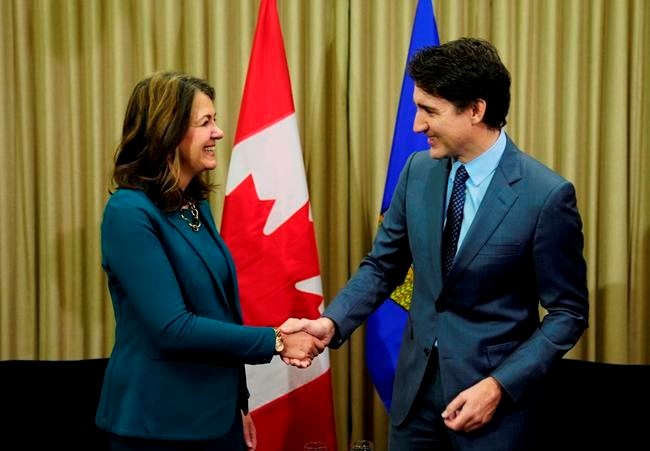CALGARY — Prime Minister Justin Trudeau pushed back Wednesday on growing demands from premiers to dump the planned April 1 hike to the consumer carbon levy, saying leaders must tackle both affordability and climate change.
"My job is not to be popular,” Trudeau said, briefly pausing and adding with a wry smile, "Although it helps."
"My job is to do the right things for Canada now and do the right things for Canadians a generation from now."
Trudeau made the comments to reporters in Calgary after meeting earlier in the day with Alberta Premier Danielle Smith for the first time since last summer.
She and six other premiers have called on Trudeau to abandon the 23-per-cent hike to help Canadians already dealing with squeezed household budgets.
Conservative Opposition Leader Pierre Poilievre has also railed against the levy and in a statement Wednesday said his party plans to force multiple votes in Parliament next week to nix the hike.
Trudeau told the news conference it's easy for governments to put off taking action on climate change so that it’s not their problem while they're in office, and for "short-term thinker politicians" to fight putting a price on carbon.
"Why are so many people still against (the carbon levy)?” he asked rhetorically at an unrelated announcement about the government's dental care program.
“Well, you know, that's a question we all have to ask.”
He said using market mechanisms, like a carbon price, to lower greenhouse gas emissions is the best way to address the issue, rather than with the "heavy hand of government" through measures like regulations and subsidies.
"I prefer a cleaner solution, a market-based solution, of saying, 'You know what? If you're behaving in ways that are gonna cause pollution, that is going to impact the whole community, you should pay for that pollution, so the community then doesn't suffer the negative sides of it or have to clean it up on their own dime.'"
Earlier Wednesday, as the premier and prime minister smiled and shook hands for the cameras, Smith thanked Trudeau’s government for pushing through the Trans Mountain pipeline expansion to the B.C. coast.
Smith, who said she'd requested a meeting with Trudeau after learning he'd be in Calgary, told a news conference in Edmonton later Wednesday that she reiterated her opposition to the carbon levy.
"I went so far as to suggest to the prime minister that he could achieve a win if he listened to the growing calls against the carbon tax and reversed his decision to increase the tax,” said Smith.
Trudeau said there are measures to ensure those who don't have the means to meaningfully shrink their carbon footprint aren't punished.
As the levy rises, so do rebates. For example, the average family of four in Alberta would get $1,800 a year.
Poilievre, in a statement, said it’s time to force votes in the house to help families.
"The ability of Canadians to put food on the table and fuel in their cars is more important than protecting Justin Trudeau’s fading political career," he said.
Canada's carbon price is set to rise by $15 to $80 a tonne on April 1.
In addition to Alberta, the governments of Nova Scotia, New Brunswick, Newfoundland and Labrador, Prince Edward Island, Ontario and Saskatchewan have spoken out.
This week, Newfoundland and Labrador Premier Andrew Furey wrote to Trudeau urging him to "pause" the carbon levy hike, "at least until inflation stabilizes, interest rates lower and related economic pressures on the cost of living sufficiently cool."
Nova Scotia Premier Tim Houston also wrote to Trudeau, calling for a different solution to fight climate change and “cancel the carbon tax before any more financial damage is done.”
P.E.I. Premier Dennis King wrote to Trudeau that his government is committed to reducing greenhouse gases, acknowledging how susceptible the island province is to extreme weather, but saying "a sustained period of inflation has significantly increased our cost of living."
In Winnipeg, Manitoba Premier Wab Kinew was asked by reporters whether he will join the list of premiers dissenting on the carbon levy.
Kinew replied that Manitoba is focused on convincing Ottawa that Manitoba's investments through its hydroelectric grid should suffice in lieu of the federal levy.
"We've been very clear that Manitoba has a really strong case to make in terms of the carbon backstop not being applied in our province, and that's because Manitobans have made huge investments in renewable power," Kinew said.
"We're going to continue to make that case."
This report by The Canadian Press was first published March 13, 2024.
-- with files from Bob Weber in Edmonton and Steve Lambert in Winnipeg
Bill Graveland and Lauren Krugel, The Canadian Press
Note to readers: This is a corrected story. An earlier version stated the federal carbon levy was to rise to $85 a tonne on April 1.




